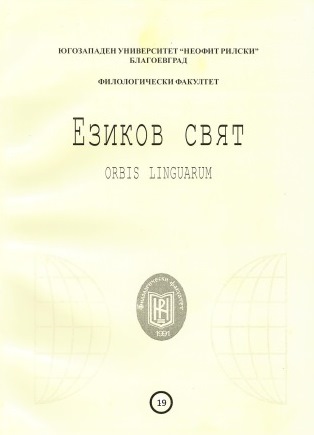MODERN SLOVAK HISTORY ON THE STAGE
MODERN SLOVAK HISTORY ON THE STAGE
Author(s): Dagmar Gary KročanováSubject(s): Theatre, Dance, Performing Arts, Fine Arts / Performing Arts
Published by: ЮГОЗАПАДЕН УНИВЕРСИТЕТ »НЕОФИТ РИЛСКИ«
Keywords: contemporary Slovak drama; contemporary Slovak theatre; historical drama; biographical drama; post-modern drama and theatre; drama of coolness; performative theatre; multimedia in theatre; post-dramat
Summary/Abstract: The paper discusses Slovak drama and theatre after 1989, especially plays that deal with significant historical moments and persons of 20th century Slovak history, such as the Holocaust, the Slovak National Uprising of 1944, Communism and partially the Velvet revolution of 1989. It mentions a shift in the interpretation of these events by the society, often related to historical research and journalism, as well as changes in theatre aesthetics after 1989. Besides historical research, performances often use elements of oral and family history to complement the collective memory. Whereas there are almost no living witnesses of the first Slovak Republic, several generations remember Communism; nevertheless, for younger spectators (and also playwrights) it already represents the remote past. Spectators of different generations therefore might have very different cognitive, emotional and moral responses to the messages communicated by plays. On the other hand, theatre still conveys some artistic quality, and the plays based on crucial moments in the 20th century Slovak history modify a traditional concept of heroism and conflict in the genres of historical drama and tragedy. The paper briefly characterizes the plot and dramatis personae, and discusses the changes in the form and genre of plays (especially biographical and documentary drama). The performances prove that intertextuality and intermediality, collective authorship, loose form or improvisation, as well as fixing the dramatic text during rehearsals and performances, along with the denial of illusive theatre, have become common approaches in contemporary Slovak drama and in professional repertoire theatres, whereas they were only used in alternative or amateur theatres before 1989. From the perspective of drama and theatre studies, post 1989 production used post-modernism, drama of coolness, as well as performative, multimedia and post-dramatic theatre.
Journal: Езиков свят - Orbis Linguarum
- Issue Year: 19/2021
- Issue No: 1
- Page Range: 117-123
- Page Count: 7
- Language: English

